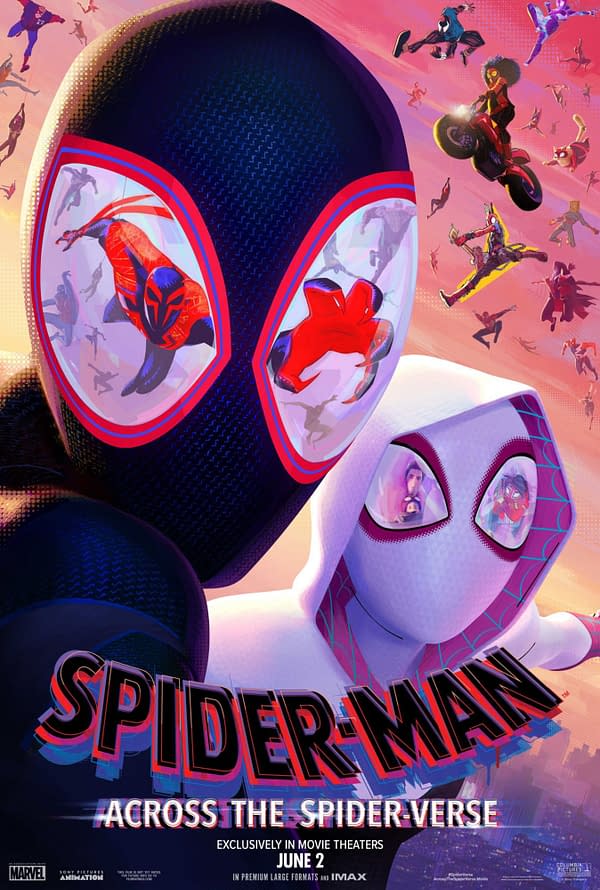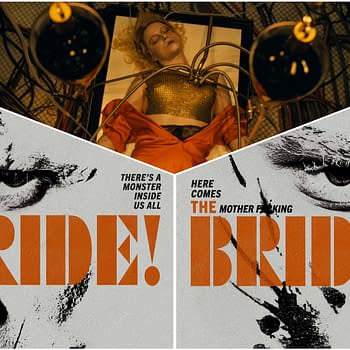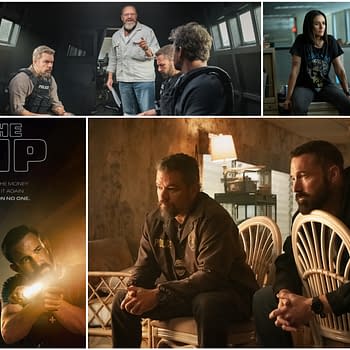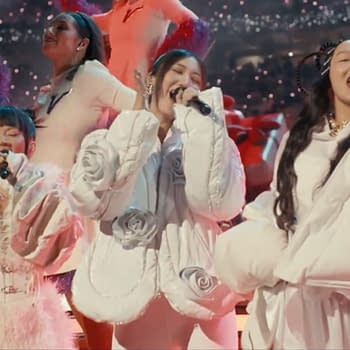Posted in: Kaitlyn Booth, Movies, Sony | Tagged: marvel, Review, sony, spider-man: across the spider-verse, spider-man: beyond the spider-verse, spider-man: into the spider-verse
Spider-Man: Across the Spider-Verse Review: Nothing Short Of Art
Spider-Man: Across the Spider-Verse has the flaws that come with being half of a movie, but the half of the movie that is presented is nothing short of art.
Spider-Man: Across the Spider-Verse has the flaws that come with being half of a movie, but the half of the film that is presented is nothing short of art.
Director: Joaquim Dos Santos, Kemp Powers, and Justin K. Thompson
Summary: Miles Morales catapults across the Multiverse, where he encounters a team of Spider-People charged with protecting its very existence. When the heroes clash on how to handle a new threat, Miles must redefine what it means to be a hero.
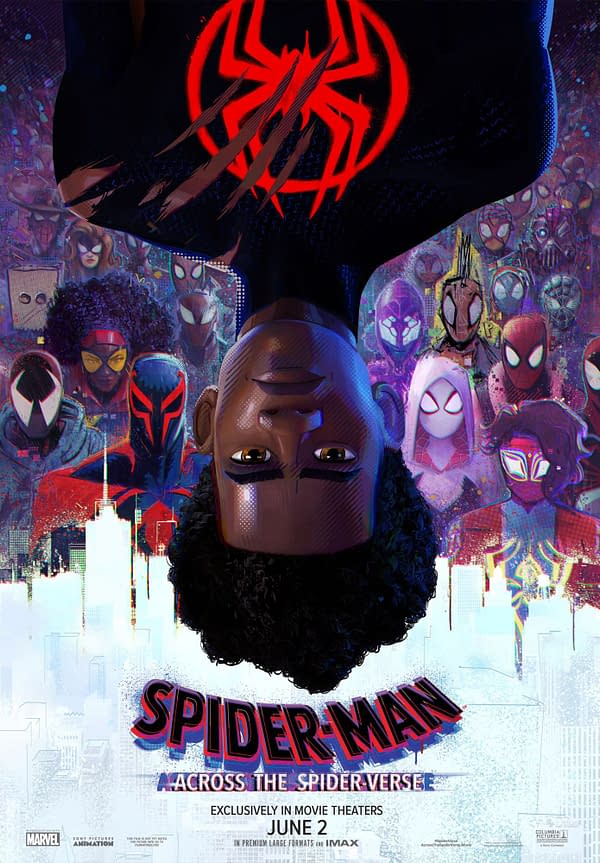
It was a surprise to precisely no one that Spider-Man: Into the Spider-Verse got the green light for a sequel in November 2018 before the movie had even come out. It was surprising, however, when in December 2021, we learned that the film would be split into two. This is not uncommon and seems to happen more often these days. Mere weeks before Sony would announce that what would become Spider-Man: Across the Spider-Verse would be two movies, Dune was released and revealed all of the problems and flaws that come from being half a movie. Harry Potter and the Deathly Hallows made the practice of splitting movies that were just too big for one film much more common, and we've seen it time and time again.
So, when talking about this film's flaws, they are the same flaws that nearly all of the "part ones" of these two-parters bear. The beginning drags a bit, and it takes some time for the story to really get going. There are some moments in the middle when it drags a little before things really kick off. There isn't much of a resolution by the time the credits roll. There has been a story, and people have gone through character arcs, but there isn't really an ending. The film ends on a literal "to be continued" of the kind you see at the bottom of comic books. All of these things are staples of movies that get split in half. When you have time to set things up in the beginning, you take it, and that's why even a film like Across the Spider-Verse feels like it takes a little too long for things to get moving. It's quite literally twenty minutes before the title credits even appear on the screen. However, all of the slower beats and build-up are there because this film is the first half of a story, so holding that against it doesn't feel quite right, but that doesn't stop things from feeling like it takes a little too long to start moving along.
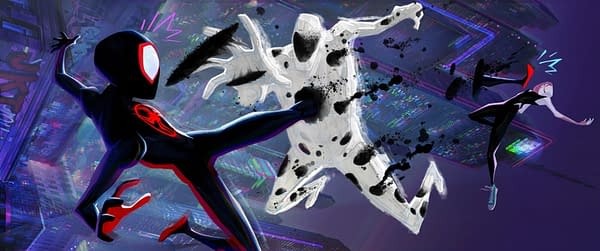
It's good that while things are taking a little too long to move things along, every single frame on screen is just art. We often said that Into the Spider-Verse was a film where you could pause it at any given time, take the image on screen, frame it, and put it on your wall. Across the Spider-Verse takes it to another level because we get to see different universes this time around. The world that Gwen Stacy looks like the comics from Jason Latour and Robbi Rodriguez. In the first film, we learned that each Spider-Person got their own animation style. In this film, we get to see not only more animation styles but we also get to see different worlds up on screen. They are all unique and beautifully visualized. There is a scene between Gwen and her father where the background becomes dripping watercolors as the conversation gets more intense, and it's easy to get distracted by how stunning every single detail in this film there is.
And details there are plenty. People will spend years combing through every frame of this film trying to find all the hidden references, and it only gets more insane when we get to the Spider-Society and see what is in store for us. Some of the Easter Eggs are incredibly obvious, while others are going to be difficult for even the most knowledgeable Marvel fans to track down. Those shots of the Spider-Society are proof of the love that went into Across the Spider-Verse because only people who love comics could pull from wells so deep and obscure.
If it seems like we're avoiding the story and character arcs, it's because we are. This review is spoiler-free, and you can't get into the story's details without revealing what Across the Spider-Verse is doing. What can be said is that the Spot is a fantastic villain, and Jason Schwartzman is some inspired casting. His connection to Miles and the story is the kind of storytelling people live for because it is all so expertly executed. Once you realize what is going on with the Spot, Miguel, the Spider-Verse, and Miles, you realize that many breadcrumbs were left for you, and you have several lightbulb moments. This isn't a "villain of the week" situation, and the Spot is here to ensure you don't say that about him.
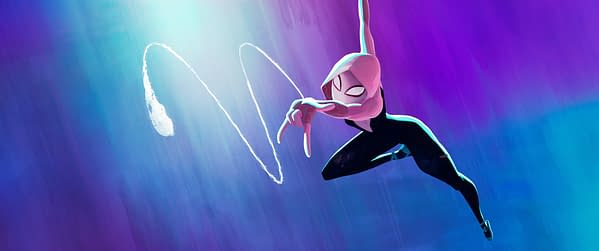
As for our various Spider-People, the standouts are Hobart "Hobie" Brown, aka Spider-Punk, whose art style might be one of the coolest things we've seen on screen yet. Pavitr Prabhakar, aka Spider-Man India, is also a lot of fun, and the details that are put into his world and his costume are something that they could have built an entire movie about. We already knew that Ben Reilly, aka Scarlet Spider, would appear, but let's say that the casting of Andy Samberg is spot on and leave it at that. Oscar Isaac and Issa Rae are instantly awesome as Miguel O'Hara, aka Spider-Man 2099, and Jessica Drew, aka Spider-Woman, respectively. Miguel's story is interesting, and the role he takes, as Isaac said in an interview, as "the one Spider-Man that doesn't have a sense of humor" is pretty spot on. They really manage to capture his "I'm So Done With This Shit" face very well. The entire returning cast is lovely, and it's so awesome to see Gwen take on the role of the second main character to Miles. This is still Miles's story, absolutely, but Gwen plays a large part in this film.
Spider-Man: Across the Spider-Verse is a film you could spend hours writing thousands and thousands of words about. However, at the end of the day, this film had to live up to the first one, which is often cited as one of the best movies of all time, not to mention one of the best superhero and animated films of all time. Across the Spider-Verse shows no sign of buckling under the weight of those expectations; in fact, it seems utterly unaware of them, making it all the more impressive. To carry the weight of heavy expectations and make it look effortless as you do more, go bigger, and break more ground, is how you get a masterpiece. When Spider-Man: Beyond the Spider-Verse comes out, and we see this whole film as intended, and it is half as good as this, that is what we'll get: a masterpiece.
